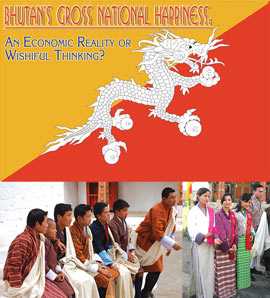Related Topics
Religious Philadelphia
William Penn wanted a colony with religious freedom. A considerable number, if not the majority, of American religious denominations were founded in this city. The main misconception about religious Philadelphia is that it is Quaker-dominated. But the broader misconception is that it is not Quaker-dominated.
Right Angle Club 2009
The 2009 proceedings of the Right Angle Club of Philadelphia, beginning with the farewell address of the outgoing president, John W. Nixon, and sadly concluding with memorials to two departed members, Fred Etherington and Harry Bishop.
Favorites - II
More favorites. Under construction.
Gross National Happiness In Bhutan

|
| Gross National Happiness |
When feudal and primitive cultures come in contact with more advanced ones, their response is apt to be to reject modernism in all its forms and trappings. The Pennsylvania Amish, the American Indian, and most Middle-Eastern countries display this response. After a while, the advanced countries just give up appealing to them, and resort to extermination, with results that are very sad. The Kingdom of Bhutan has a 28 year-old king who went to Oxford, a long-rejected Mongolian Genghis Khan heritage, and a reflective self-denying Buddhist religion. Twenty-five Stanford professors who every year come and study the place may possibly contribute something to locally prevailing ideas as much as they learn from them. In any event, the charming Bhutan response of Karma Galay (Gross National Happiness) ought to be deeply thought-provoking.
Unlike so many other countries in this position, Bhutan does not resist progress but fully anticipates it. They also anticipate the disorder which will result when their young people watch satellite television and want to have some of those consumer durables for themselves. Buddhist culture teaches you to keep your life simple, and the root of all observable evil is -- craving. What's obviously more important is to be happy, so why not measure happiness in some Western way and see how you are collectively doing. From this comes the idea that since economic strivers and cravers measure their economic progress by Gross National Product, why not apply a statistical approach to what Buddhists truly want, which is happiness, and see how they are making out?
That includes a broad methodology. Buddhist teaching emphasizes never harming any sentient creature, but rather devoting constant attention to removing impediments to happiness from themselves and others. A country dead-set against consumerism recognizes that Internet and TV are going to assault them with consumerism, and they want to preserve an open mind about whether it is improving happiness or injuring it. Most American parents would agree that a case can be made in both directions, so let's be fair, let's measure it. No doubt many of the monks harbor a suspicion that happiness will lose, and proven deterioration in GNH can be used to show why they should close their borders and hunker down. Others, probably including those Stanford professors, probably anticipate that a demonstrated rise in GNH can be used to pacify the conservatives whenever the facts show the whole country is happier if they substitute something else for rancid butter tea, rice and potatoes. On a less grandiose level, perhaps different strategies of education can be tested as Bhutan goes from the Fifteenth Century to the Twenty-first, relieving stress when it appears, and augmenting community contentment if something probably has that result.
Maybe all Americans should give some thought to what is being said, here. Maybe in a strange way that's what Castro was failing to do in Cuba, and Cuba could now become an experimental laboratory for GNH measurement. Or Iraq or Russia. And of course, let's measure the consequences of our own cravings for achievement. Is, or is not, most of this self-denial just a lot of sour grapes? Let's give some thought to this, because if Thou shouldst mark iniquity, Oh Lord, who shall stand?
Originally published: Friday, January 09, 2009; most-recently modified: Tuesday, May 21, 2019